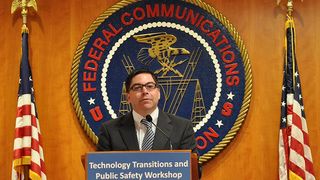FCC's O'Rielly: Time to Jettison Myopic Vision of Broadcast Market

A feisty FCC Commissioner Michael O'Rielly told an audience of broadcasters in town to press the D.C. flesh and their positions on various policymakers that if the FCC gets its latest (quadrennial) review of ownership rules right, it will "allow the Commission to jettison its myopic vision that broadcasters experience little competition in favor of one that recognizes the fulsome competitive forces in the current marketplace."
He also provided an update on the kids TV rule item he is motormanning, and pledged not to let broadcasters go dark if they have issues with the TV station repack that can't be resolved by the good faith efforts of stations and the FCC.
That "myopic" FCC vision appeared not to be a knock on the current chairman, who shares O'Rielly's view that broadcasters face far more competition than they are given credit for in Washington regulatory policy, but on the FCC's, and Justice's, historic reluctance to view the broadcast competitive market more broadly in a world of MVPDs and VOD and OTT and various other acronyms. "The misguided definition of a competitive marketplace is not just an FCC phenomenon," he said. "The Department of Justice (DOJ) shares such blind ignorance or willingness to inflict unjustified pain."
O'Rielly urged the National Association of Broadcasters State Leadership Conference crowd Tuesday (Feb. 26) to engage in the quadrennial review process even if they are not looking to merge with someone. He suggested it was in their interests to make the case for the competitiveness of their market generally because how the FCC views the market will have an impact on a host of other regulatory—"and hopefully deregulatory"—actions, altering how broadcasters are viewed by "advertisers, investors, competitors, consumers, and everyone in between."
O'Rielly said he did not ascribe to the view that broadcasters were dinosaurs, but if they were, the FCC should untie their hands to allow them to be the T-Rex or Velociraptor and "go after those high-tech snowflakes’ market share."
The "snowflakes" reference followed this passage early in his speech: "Just last Wednesday, a few snowflakes flew, and the entire town shut down. In fairness, these were real snowflakes, not a bunch of whiny, angst-driven teenagers forced to deal with a world outside of their parents’ bubble."
O'Rielly's conservative chops were elsewhere on display when he talked about opting out of going to the Mobile World Congress in Barcelona, which he has done in the past, in favor of the NAB event. "[T]his year, I made a decision early on, having missed this event too often, that, instead of talking wireless with the international community, I would spend my time with those who actually embrace American capitalism and values, those who rightfully reject the move to consider adopting the broken theology of socialism, and those who believe serving their local communities is the right thing to do and who don’t need government edicts to do so," he said.
Broadcasting & Cable Newsletter
The smarter way to stay on top of broadcasting and cable industry. Sign up below
O'Rielly hit on several topics in his speech.
He promised that he would not let the FCC force stations to go dark if it has issues with the post-incentive auction repack. O'Rielly does not control the agenda, but he said: "You have my word that I will not let that happen."
But he did suggest that while most experts he talked to did not think phase II of the repack—which ends in mid-April—would present any issues, there could be trouble ahead. "Most experts I have spoken to do not anticipate tremendous difficulties until Phases 3 or 4," he said.
But O'Rielly also said that his promise was not an invitation to become "lackadaisical," suggesting the FCC's good faith effort not to push anyone off the air should be matched by a similar effort to work with the FCC to resolve any issues before that became a possibility.
The commissioner warned the crowd not to get "greedy or seek unfair enrichment for the reallocation" of C-band spectrum and, if that were the case, the FCC provide full reimbursement and re-tuning for any broadcaster affected. But he made clear that a "good portion" of the C-band spectrum was going to be reallocated. That is the band of satellite spectrum that broadcasters and cable operators use to receive network programming.
Commissioner O'Rielly also provided an update on the kids TV rule revamp the chairman deputized him to oversee. He said there might be some added complexity to compliance as the trade-off for more flexibility in how stations comply, but said he hoped they would see the benefits of that trade-off.
O'Rielly said he had read comments during the government shutdown, had begun mapping out a possible path forward, and that his original goal remains the same: "[P]rovide some greatly needed flexibility for television broadcasters, respond to the tremendous market changes since the Commission’s last modifications, and preserve the television experience for those children who rely on or enjoy existing children’s programming."
Contributing editor John Eggerton has been an editor and/or writer on media regulation, legislation and policy for over four decades, including covering the FCC, FTC, Congress, the major media trade associations, and the federal courts. In addition to Multichannel News and Broadcasting + Cable, his work has appeared in Radio World, TV Technology, TV Fax, This Week in Consumer Electronics, Variety and the Encyclopedia Britannica.

